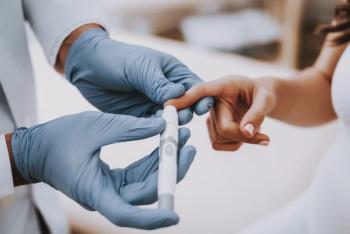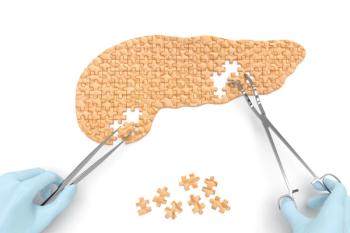
- Drug Topics January/February 2024
- Volume 168
- Issue 01
Elranatamab-bcmm Approved for Adult Patients With Relapsed or Refractory Multiple Myeloma
The novel drug elranatamab-bcmm (Elrexfio) received accelerated FDA approval on August 14, 2023, for treating adults with relapsed or refractory multiple myeloma.
Novel drug product elranatamab-bcmm (Elrexfio) was granted accelerated FDA approval on August 14, 2023, for the treatment of adult patients with relapsed or refractory multiple
The drug is a bispecific B-cell maturation antigen (BCMA)–directed T cell–engaging antibody that binds BCMA on plasma cells, plasmablasts, and multiple myeloma cells and CD3 on T cells, leading to cytolysis of the BCMA-expressing cells. Elranatamab-bcmm–activated T cells cause proinflammatory cytokine release and result in multiple myeloma cell lysis. It has a black box warning for cytokine release syndrome (CRS) and neurologic toxicities including immune effector cell–associated neurotoxicity syndrome (ICANS).
Efficacy
MagnetisMM-3 (
In pivotal cohort A, the median time to first response was 1.22 months (range, 0.9-6.5 months). With a median follow-up of 11.1 months among responders, the DOR rate at 6 months was 90.4% and at 9 months was 82.3%. In the supportive cohort B group, ORR was 33.3%. After a median follow-up of 10.2 months (range, 9.9-11 months), median DOR was not reached and the DOR rate at 9 months was 84.3%.
Safety
Elranatamab-bcmm causes release of cytokines that may suppress the activity of cytochrome P450 (CYP) enzymes, leading to increased exposure to CYP substrates, which may lead to serious adverse reactions. Thus, monitoring drug concentrations of CYP substrates and signs of toxicities while on elranatamab-bcmm is important. The most common adverse reactions (> 20%) reported from the trial were predominantly immune-related effects including CRS, fatigue, injection site reactions, diarrhea, upper respiratory tract infections, musculoskeletal pain, pneumonia, decreased appetite,
READ MORE:
Some grade 3 and grade 4 laboratory abnormalities (≥ 30%) were noted, including a decrease in lymphocytes, neutrophils, hemoglobin, white blood cells, and platelets. Other clinically relevant adverse reactions in less than 10% of patients who received elranatamab-bcmm were ICANS, febrile neutropenia, Guillain-Barre syndrome, abdominal pain, acute kidney injury,
Dosing and Administration
The recommended dosing schedule for elranatamab-bcmm subcutaneous injection is as follows: step-up dose 1 of 12 mg on day 1, step-up dose 2 of 32 mg on day 4, followed by the first treatment dose of 76 mg on day 8, and then 76 mg weekly thereafter through week 24. For patients who have received at least 24 weeks of treatment with elranatamab-bcmm and have achieved a response (partial response or better) and maintained this response for at least 2 months, the dose interval should transition to an every-2-week schedule.
Pretreatment medications are required with each step-up and maintenance dose of elranatamab-bcmm; those medications include oral acetaminophen 650 mg, oral or intravenous dexamethasone 20 mg, and oral diphenhydramine 25 mg. There were no significant diferences in the pharmacokinetics of elranatamabbcmm observed in either renal or hepatic impairment.
Feryal Alhamadani, PharmD, is a PGY-1 pharmacy resident at John Dempsey Hospital/ UConn Health, Farmington, Connecticut. Kevin W. Chamberlin, PharmD, FASCP, is the associate vice president and chief pharmacy ofcer at John Dempsey Hospital/UConn Health, Farmington, Connecticut.
READ MORE:
References
1. Elrexfio.Prescribing information. Pfizer; August 2023. https://www.accessdata.fda.gov/drugsatfda_docs/label/2023/761345s000lbl.pdf
2. Lesokhin AM, Tomasson MH, Arnulf B, et al. Elranatamab in relapsed or refractory multiple myeloma: phase 2 MagnetisMM-3 trial results. Nat Med. 2023;29(9):2259-2267. doi:10.1038/s41591-023-02528-9
Articles in this issue
almost 2 years ago
Lecanemab-irmb Approved for Alzheimer Diseasealmost 2 years ago
OTC Product Roundup: Cough, Cold, and Flualmost 2 years ago
Stealing With Our Eyes Openalmost 2 years ago
2024 Pharmacy Forecast: A Focus on Mental Healthabout 2 years ago
HHS Issues Reminder to Health Plans: Provide Contraceptive Coverageabout 2 years ago
Paxlovid Found Not to Reduce Long COVID RiskNewsletter
Pharmacy practice is always changing. Stay ahead of the curve with the Drug Topics newsletter and get the latest drug information, industry trends, and patient care tips.























